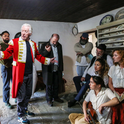Kenneth MacMillan’s controversial ballet The Judas Tree CINEMA
Green Zone dir Paul Greengrass. On general release from 12th March Last year, British production company Working Title strayed beyond its natural comfort zone with dramas—notably Frost/Nixon and State Of Play—that failed to enhance parent company Universal’s bottom line. Paul Greengrass’s Green Zone might have been another such case until costly reshoots in late 2008 (its release was bumped all the way to spring 2010).
This troubled business context may be a factor in the transition from the property Working Title acquired—Rajiv Chandrasekaran’s account of the blundering postwar provisional authority in Iraq, Imperial Life in the Emerald City—into the film it has made. The marketers are trying hard to suggest a pulse-quickening military adventure from the director of The Bourne Supremacy, with a trailer that omits the words “Iraq” and “Baghdad”—and who can blame them? The Iraq war has proved toxic at the box office.
The surprise is that, for once, the marketing doesn’t lie. Green Zone really is a tense chase thriller, in which rogue CIA officer Brendan Gleeson sees the perils of Paul Bremer’s wholesale dismantling of Ba’ath power structures, and tasks American soldier Matt Damon with bringing in an Iraqi general the US authorities wish to eliminate. Happily, Greengrass’s signature gritty aesthetic—shaky handheld cameras, grainy night-vision footage—licenses the discerning cinemagoer to overlook the film’s bad faith to its source material and surrender to a big-screen guilty pleasure.
Charles Gant is film editor of Heat magazine
FOLK MUSIC
Have One on Me by Joanna Newsom (Drag City) Folk music is enjoying interesting times. Unlike classical music, whose endless centenaries and revivals root it firmly in the historical, folk is employing its own traditions to create original and relevant work. Young American acts like Grizzly Bear, Devendra Banhart, Sufjan Stevens and, arguably, Animal Collective, are writing the kind of innovative music which, though reminiscent of the late 1960s and early 1970s electric scene, is just as comfortable in the hip bars of New York and London as a beer tent in Dorset.
Since her classic 2004 debut album, The Milk-Eyed Mender, Joanna Newsom has proved herself just as inventive, not least for the nuanced phrases and rhythms which she plucks from her instrument, the pedal harp. But it is her voice which is truly striking. Persistent, liberated, at times even feral, its girlish, petulant pitch cuts right into the poetry of her lyric writing. And combined with the quirky arrangements that sometimes accompany her songs (Beach Boys collaborator Van Dyke Parks orchestrated her last album) the effect is to transport you along undiscovered paths of the Appalachian Mountains, even when stuck in a traffic jam on the A4. Have One On Me, her third album, is an ambitious triple CD set, but may prove to be the broadest and most beautiful landscape yet.
Nick Crowe is a music writer and a former drummer
FICTION
Point Omega by Don DeLillo (Picador, £14.99) Don DeLillo’s short, very odd but oddly brilliant new novel is set in just two locations. One is a room in a New York gallery where an unnamed man obsessively watches a video installation, 24 Hour Psycho, consisting of repeat screenings of Hitchcock’s film slowed down so that it takes a whole day to run. The other is a house in the desert, to which neocon intellectual Richard Elster has repaired, pursued by a young filmmaker, Jim Finley, who wants him to talk to camera about his experiences advising the Pentagon in the run-up to Iraq.
Little happens in either storyline—or little that would conventionally be called “action”—but that of course is DeLillo’s point: this is a novel about the “slowing of motion,” and the kind of watching and thinking that become possible when the usual time constraints cease to apply. DeLillo’s prose rises to the challenge: both the snail-paced footage and the desert scenery are mesmerisingly described. Does the novel offer any profound insights into American foreign policy? Probably not, other than functioning as a kind of anti-argument, a wholesale rebuttal of the “overarching ideas and principles” that Elster, in his role as “conceptualiser” of war, was required to supply.
William Skidelsky is books editor of the Observer
MUSIC
John Adams Focus Barbican Centre, until 25th March, Tel: 0845 120 7500 John Adams is that rare thing, a living composer whose work has struck a chord with audiences well beyond the borders of the “new music” world. One reason for Adams’s eminence is that he spurns the fastidious “apolitical” stance of most composers and tackles big and often contentious themes. This five-concert series at the Barbican in London includes one of them: a symphony drawn from his most recent opera, Dr Atomic, which examines the agonised self-questioning of Robert
Oppenheimer, leader of the team that created the first atomic bomb. But there are more straightforward reasons for Adams’s rise to being the best-known “classical” composer worldwide. One is that he brings back the richly expressive harmonic palette which had long been absent from new music. Another is that his music pulsates with the rhythmic energy of American popular music, filtered through the interlocking patterns of minimalism. Together these create an inimitable relaxed energy and a sense of large spaces unfolding, like a drive down a Californian interstate in sound.
This series includes his latest orchestral score, City Noir, which brilliantly evokes the nocturnal menace and glamour of film noir, plus the British premieres of two new chamber works.
Ivan Hewett is the Telegraph’s music critic
DANCE
Kenneth MacMillan triple bill Royal Opera House, 23rd March-15th April, Tel: 0207 304 4000 In 1992 Kenneth MacMillan died, both tragically and fittingly, backstage at the Royal Opera House during a performance of his ballet Mayerling. Had he lived, he would now be celebrating his 80th birthday. Yet amid the tributes being paid—the publishing of a new biography (Different Drummer by Jann Parry), the performance of a dedicated triple bill—the nature of MacMillan’s legacy is still being debated.
Back in the 1960s MacMillan established himself as the angry young man of ballet. Frustrated by the art form’s lingering fairytale cuteness, he made it his mission to embrace the darkness and danger of real life. He could craft beautiful steps with the best of them, but he choreographed works that dealt with madness, brutality, war and loss, and tested the limits of the classical vocabulary.
In many ways the urgency of Macmillan’s quest made him the most important choreographer of his generation. But critics sometimes saw a muddle of means, and an incoherence of tone. His last ballet, The Judas Tree, was as controversial as any he made in its heated convergence of mysticism and gang rape. And the debate will be revived when it returns to the stage in the Royal Ballet’s tribute programme, alongside the more innocent, crowd-pleasing ballets Concerto and Elite Syncopations.
Judith Mackrell is the Guardian’s dance critic
THEATRE
Sweet Nothings by Arthur Schnitzler, dir Luc Bondy, Young Vic Theatre, 1st March-10th April, Tel: 020 7922 2922 The great Swiss director Luc Bondy—who has just produced a controversial Tosca at the New York Met—returns to the Young Vic where, in 2004, he directed a compelling update of Sophocles by Martin Crimp, Cruel and Tender. This time, it’s a new version of Arthur Schnitzler’s Viennese tragedy Liebelei, reworked by the talented Scottish playwright David Harrower. A young man has an affair with a married woman. At a party, he flirts with a girl who falls headlong in love with him. Meanwhile, the married woman’s husband looms.
Tom Stoppard translated the play as Dalliance for the National Theatre in 1986, mixing secessionist fin de siècle charm with a trademark biting wit. But Bondy and Harrower are updating it to the contemporary metropolitan scene, as Sam Mendes and David Hare did with Schnitzler’s La Ronde—seen as The Blue Room with Nicole Kidman at the Donmar Warehouse in 1998.
A pungent blast of misdirected sensuality seems on the cards with a cast of hot names including Natalie Dormer (Anne Boleyn in The Tudors on television) and Tom Hughes (from the new Ian Dury biopic Sex & Drugs & Rock & Roll). The event also marks an interesting collaboration between the Young Vic and Bondy’s Vienna Festival, as well as the co-commissioning Warwick Arts Centre.
Michael Coveney is chief theatre critic of Whatsonstage.com
Green Zone dir Paul Greengrass. On general release from 12th March Last year, British production company Working Title strayed beyond its natural comfort zone with dramas—notably Frost/Nixon and State Of Play—that failed to enhance parent company Universal’s bottom line. Paul Greengrass’s Green Zone might have been another such case until costly reshoots in late 2008 (its release was bumped all the way to spring 2010).
This troubled business context may be a factor in the transition from the property Working Title acquired—Rajiv Chandrasekaran’s account of the blundering postwar provisional authority in Iraq, Imperial Life in the Emerald City—into the film it has made. The marketers are trying hard to suggest a pulse-quickening military adventure from the director of The Bourne Supremacy, with a trailer that omits the words “Iraq” and “Baghdad”—and who can blame them? The Iraq war has proved toxic at the box office.
The surprise is that, for once, the marketing doesn’t lie. Green Zone really is a tense chase thriller, in which rogue CIA officer Brendan Gleeson sees the perils of Paul Bremer’s wholesale dismantling of Ba’ath power structures, and tasks American soldier Matt Damon with bringing in an Iraqi general the US authorities wish to eliminate. Happily, Greengrass’s signature gritty aesthetic—shaky handheld cameras, grainy night-vision footage—licenses the discerning cinemagoer to overlook the film’s bad faith to its source material and surrender to a big-screen guilty pleasure.
Charles Gant is film editor of Heat magazine
FOLK MUSIC
Have One on Me by Joanna Newsom (Drag City) Folk music is enjoying interesting times. Unlike classical music, whose endless centenaries and revivals root it firmly in the historical, folk is employing its own traditions to create original and relevant work. Young American acts like Grizzly Bear, Devendra Banhart, Sufjan Stevens and, arguably, Animal Collective, are writing the kind of innovative music which, though reminiscent of the late 1960s and early 1970s electric scene, is just as comfortable in the hip bars of New York and London as a beer tent in Dorset.
Since her classic 2004 debut album, The Milk-Eyed Mender, Joanna Newsom has proved herself just as inventive, not least for the nuanced phrases and rhythms which she plucks from her instrument, the pedal harp. But it is her voice which is truly striking. Persistent, liberated, at times even feral, its girlish, petulant pitch cuts right into the poetry of her lyric writing. And combined with the quirky arrangements that sometimes accompany her songs (Beach Boys collaborator Van Dyke Parks orchestrated her last album) the effect is to transport you along undiscovered paths of the Appalachian Mountains, even when stuck in a traffic jam on the A4. Have One On Me, her third album, is an ambitious triple CD set, but may prove to be the broadest and most beautiful landscape yet.
Nick Crowe is a music writer and a former drummer
FICTION
Point Omega by Don DeLillo (Picador, £14.99) Don DeLillo’s short, very odd but oddly brilliant new novel is set in just two locations. One is a room in a New York gallery where an unnamed man obsessively watches a video installation, 24 Hour Psycho, consisting of repeat screenings of Hitchcock’s film slowed down so that it takes a whole day to run. The other is a house in the desert, to which neocon intellectual Richard Elster has repaired, pursued by a young filmmaker, Jim Finley, who wants him to talk to camera about his experiences advising the Pentagon in the run-up to Iraq.
Little happens in either storyline—or little that would conventionally be called “action”—but that of course is DeLillo’s point: this is a novel about the “slowing of motion,” and the kind of watching and thinking that become possible when the usual time constraints cease to apply. DeLillo’s prose rises to the challenge: both the snail-paced footage and the desert scenery are mesmerisingly described. Does the novel offer any profound insights into American foreign policy? Probably not, other than functioning as a kind of anti-argument, a wholesale rebuttal of the “overarching ideas and principles” that Elster, in his role as “conceptualiser” of war, was required to supply.
William Skidelsky is books editor of the Observer
MUSIC
John Adams Focus Barbican Centre, until 25th March, Tel: 0845 120 7500 John Adams is that rare thing, a living composer whose work has struck a chord with audiences well beyond the borders of the “new music” world. One reason for Adams’s eminence is that he spurns the fastidious “apolitical” stance of most composers and tackles big and often contentious themes. This five-concert series at the Barbican in London includes one of them: a symphony drawn from his most recent opera, Dr Atomic, which examines the agonised self-questioning of Robert
Oppenheimer, leader of the team that created the first atomic bomb. But there are more straightforward reasons for Adams’s rise to being the best-known “classical” composer worldwide. One is that he brings back the richly expressive harmonic palette which had long been absent from new music. Another is that his music pulsates with the rhythmic energy of American popular music, filtered through the interlocking patterns of minimalism. Together these create an inimitable relaxed energy and a sense of large spaces unfolding, like a drive down a Californian interstate in sound.
This series includes his latest orchestral score, City Noir, which brilliantly evokes the nocturnal menace and glamour of film noir, plus the British premieres of two new chamber works.
Ivan Hewett is the Telegraph’s music critic
DANCE
Kenneth MacMillan triple bill Royal Opera House, 23rd March-15th April, Tel: 0207 304 4000 In 1992 Kenneth MacMillan died, both tragically and fittingly, backstage at the Royal Opera House during a performance of his ballet Mayerling. Had he lived, he would now be celebrating his 80th birthday. Yet amid the tributes being paid—the publishing of a new biography (Different Drummer by Jann Parry), the performance of a dedicated triple bill—the nature of MacMillan’s legacy is still being debated.
Back in the 1960s MacMillan established himself as the angry young man of ballet. Frustrated by the art form’s lingering fairytale cuteness, he made it his mission to embrace the darkness and danger of real life. He could craft beautiful steps with the best of them, but he choreographed works that dealt with madness, brutality, war and loss, and tested the limits of the classical vocabulary.
In many ways the urgency of Macmillan’s quest made him the most important choreographer of his generation. But critics sometimes saw a muddle of means, and an incoherence of tone. His last ballet, The Judas Tree, was as controversial as any he made in its heated convergence of mysticism and gang rape. And the debate will be revived when it returns to the stage in the Royal Ballet’s tribute programme, alongside the more innocent, crowd-pleasing ballets Concerto and Elite Syncopations.
Judith Mackrell is the Guardian’s dance critic
THEATRE
Sweet Nothings by Arthur Schnitzler, dir Luc Bondy, Young Vic Theatre, 1st March-10th April, Tel: 020 7922 2922 The great Swiss director Luc Bondy—who has just produced a controversial Tosca at the New York Met—returns to the Young Vic where, in 2004, he directed a compelling update of Sophocles by Martin Crimp, Cruel and Tender. This time, it’s a new version of Arthur Schnitzler’s Viennese tragedy Liebelei, reworked by the talented Scottish playwright David Harrower. A young man has an affair with a married woman. At a party, he flirts with a girl who falls headlong in love with him. Meanwhile, the married woman’s husband looms.
Tom Stoppard translated the play as Dalliance for the National Theatre in 1986, mixing secessionist fin de siècle charm with a trademark biting wit. But Bondy and Harrower are updating it to the contemporary metropolitan scene, as Sam Mendes and David Hare did with Schnitzler’s La Ronde—seen as The Blue Room with Nicole Kidman at the Donmar Warehouse in 1998.
A pungent blast of misdirected sensuality seems on the cards with a cast of hot names including Natalie Dormer (Anne Boleyn in The Tudors on television) and Tom Hughes (from the new Ian Dury biopic Sex & Drugs & Rock & Roll). The event also marks an interesting collaboration between the Young Vic and Bondy’s Vienna Festival, as well as the co-commissioning Warwick Arts Centre.
Michael Coveney is chief theatre critic of Whatsonstage.com













